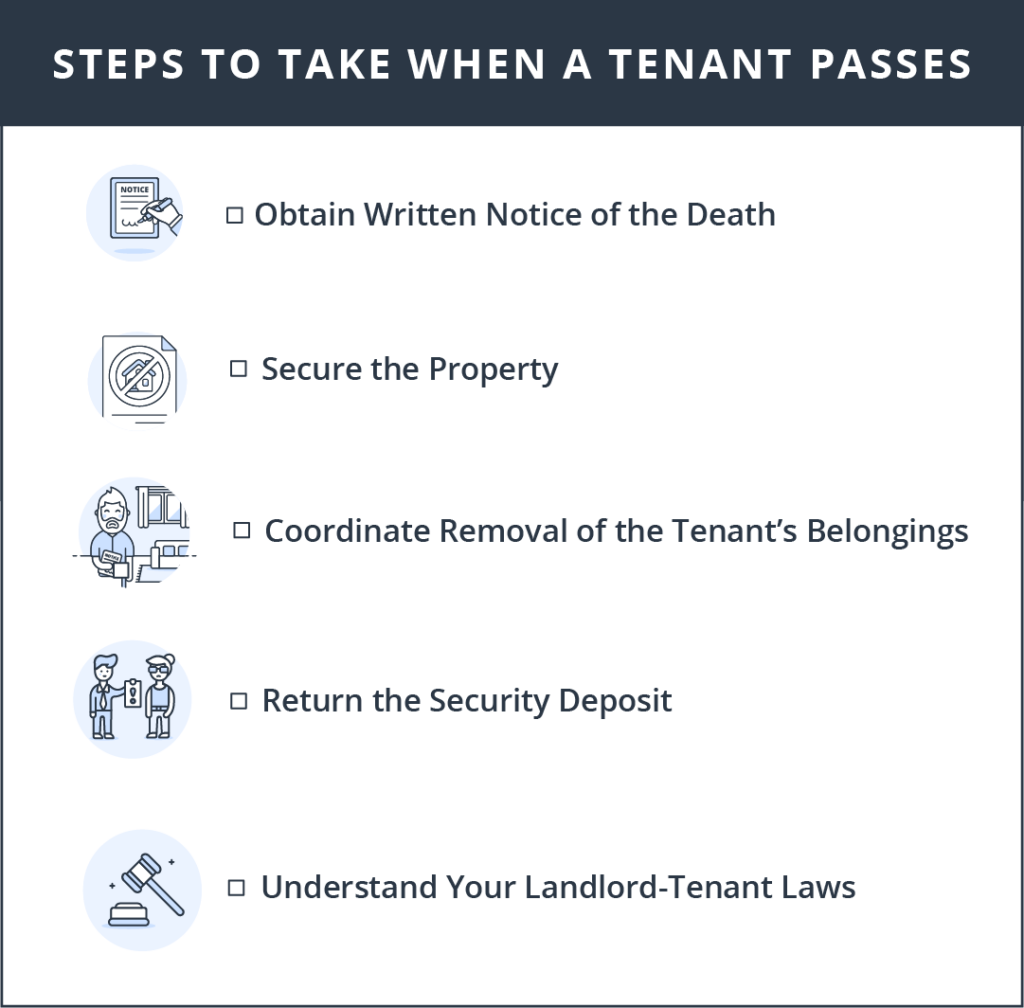There are essential steps a landlord must follow to be protected both legally and financially if their tenant dies in their rental property. While you should always check your local and state laws in the unfortunate event that you are presented with a tenant death, we have outlined guidelines landlords can follow to protect themselves and gracefully move past the tragic event.

Get Written Notice
The first step when dealing with a tenant passing is obtaining a written notice of the death. A landlord will usually find out one of two ways – either from a family member or from the executor of the tenant’s estate. Receiving a written notice is essential to legally begin the process of ending the lease, lawfully removing the tenant’s possessions, and preparing the property for the next renter.
If you discover the death, immediately call the police and the emergency contact listed by the tenant. Do not move anything or take any personal property from the unit. Wait for the authorities and the emergency contact to arrive. Again, check your state and local laws regarding this kind of event so you’re prepared ahead of time. This will help you keep your cool if this unfortunate occasion should arise.
Once you receive written notice of the death of a tenant, you can move on to the next step.
Secure the Property
After you have received written notification of the tenant’s passing, the next step is to secure the property. Lock all the windows and doors to avoid any theft. If the tenant lived alone you may want to consider changing the locks to avoid people entering the property without authorization.
As the landlord, remember that you are not responsible for securing the tenant’s belongings. The next of kin or the executor of the estate will take care of this – even after they have officially handed over the keys. If there is no next of kin or estate executor, follow your local and state laws regarding abandoned tenant property.
Once the next of kin or executor of the estate has officially handed over the keys, the landlord is not responsible for securing the tenant’s belongings. If there is no next of kin or estate executor, follow your local and state laws regarding abandoned tenant property.
What Happens to the Lease if a Tenant Passes Away?
Following the death of the tenant, the landlord will need to end or transition the remainder of the lease. When communicating with the next of kin, tenant’s family, or estate executor, be sure to have compassion for their situation, while respectively working to regain the property.
Below are two common lease options, along with the appropriate next steps:
- Month-to-Month Lease – The tenant’s death will act as the 30-day notice. Notify the next of kin or executor of the date that the lease will end, and coordinate with them regarding removing possessions, cleaning, transitioning the property, and all related deadlines.
- Long-Term Lease – If the deceased tenant had a long-term lease, the lease does not end automatically when the tenant passes. The lease will transition to the next of kin or the estate executor. Typically, the next of kin or deceased tenant’s executor will want to end the lease. It is advisable to work with them to end the lease and let them know that you will treat the death as a broken lease agreement, meaning they’ll need to pay rent until you re-rent the unit.
What to Do With a Tenant’s Belongings After They Pass Away
As a landlord, you cannot remove the belongings of the deceased tenant, so you’ll need to work with the family or executor to coordinate. Set a timeline to help move the process along. If the tenant was on a month-to-month lease and the lease will be ending soon, set more aggressive timelines to help remove the tenant’s belongings so the re-renting process can begin.
If the tenant had a long-term lease agreement, rent is still required to be paid while the property removal and tenant search are being conducted if it was decided to treat the death as a broken lease.
If there isn’t a next of kin, follow your local and state laws regarding abandoned tenant property. You may be required to hold it for a current amount of time, then sell it at auction and return the money to the state.
What Should You Do With the Security Deposit if a Tenant Passes Away?
The security deposit may be used for unpaid rent, significant wear and tear, and cleaning fees. Be sure to make an itemized list of all deductions and give that to the next of kin or estate executor when the remainder is returned. Here is a sample letter to a tenant for damages that can be used when deducting items from the security deposit. If the fees exceed the deposit, the landlord will need to petition the tenant’s estate for compensation.
Dealing with a tenant passing is never an ideal situation. Your top priority as a landlord is to make sure you are protected legally by following all local and state laws regarding a tenant’s death. Following the proper procedures can help ease the financial impacts, as well as allow you to find a new tenant as quickly as possible. If there are next of kin, be as compassionate as possible, work with the family to remove any personal belongings, and get the rental returned to a place where it can lawfully be turned back to you.
When you are ready to find a new tenant, be sure to complete a thorough tenant screening and online rental application.
What to Do if a Tenant Dies in a Rental FAQs
What is the first thing to do if a tenant passes away?
Get written notification of a tenant’s death and be sure to secure the property to protect it from potential theft. Establish a relationship with the next of kin or executor so you can surrender the key and let them manage the property.
If the tenant lived alone, make sure to accompany any person requesting access to the property when entering. Keep inventory of anything that was removed.
Does a tenant’s death void the lease agreement?
The lease type will determine the end date. If it was a month-to-month lease, the death will serve as a 30-day notice. If it was a long-term lease, it will transfer to the next of kin/estate executor.
What should you do with a tenant’s belongings if they pass away in your rental?
A landlord can’t remove the belongings of a deceased tenant without first working with the next of kin/estate executor. If neither of those exists, check your local and state laws to see how to handle a tenant’s abandoned property.
What should you do with a deceased tenant’s security deposit?
The security deposit can be used for unpaid rent, damages beyond typical wear and tear, and cleaning fees. The remainder, plus an itemized list, should be returned to the next of kin/estate executor.
Disclaimer: TurboTenant, Inc does not provide legal advice. This material has been prepared for informational purposes only. All users are advised to check all applicable local, state, and federal laws and consult legal counsel should questions arise.








